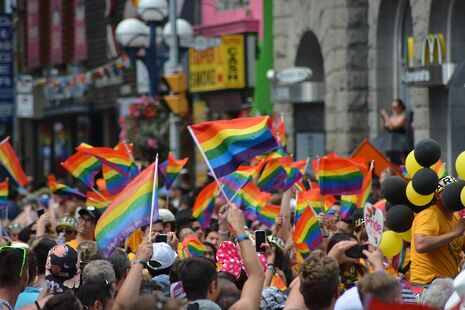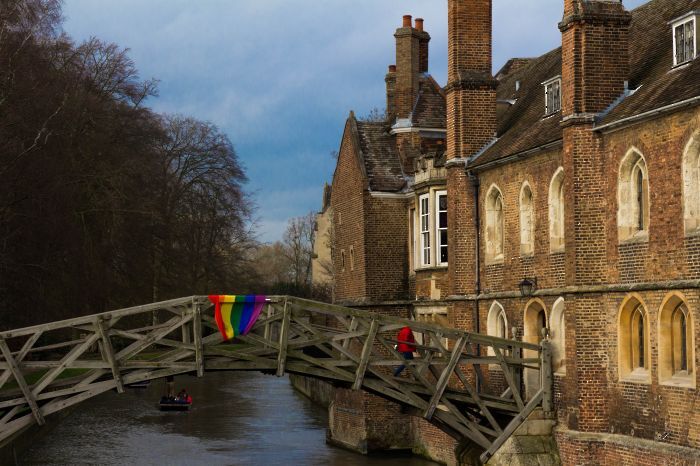Why we still need to fight for LGBT+ rights
Although the past two decades have seen huge advances in LGBT+ rights, Simon Percelay argues that the battle for equality is still ongoing

As History Month approaches, it is always comforting to reflect on how much LGBT+ rights have improved over the past 25 years. In that time, the WHO declassified same-sex attraction as a mental illness, the age of consent for same-sex relations was lowered to the same level as for heterosexual relations, multiple organisations and charities were founded to defend LGBT+ rights, discrimination on the grounds of LGBT+ identity was made illegal, Section 28 was repealed, civil partnership and (eventually) same-sex marriage were legalised. Most importantly, public opinion has changed dramatically: in the space of a single generation, the majority of the population has come to support the rights of homosexual people, whilst transgender individuals are becoming more visible, accepted and supported.
This situation has led some to question why LGBT+ rights need to be fought for anymore. A simple look at online comments for any LGBT-related topic will feature people seemingly supportive of LGBT+ rights, yet who are “tired” of seeing these issues being discussed all the time. In a Daily Mail article reporting on the LGBT+ inclusive services held in the chapels of King’s, John’s and Trinity in Michaelmas 2017, multiple comments complained that these services excluded non-LGBT+ people. An enlightened commenter called willowbrae even went on to note that “being LGBT or gender fluid now seems to be the new normal”. Now that we’ve reached equal rights with same-sex marriage and LGBT+ identities are the new trend, why won’t we just be quiet?
Beyond the fact that these comments are often used as excuses to hide deep-rooted homophobia and transphobia, the idea still deserves some thought. In fact, it has spread within the LGBT+ community itself, with some of its members arguing that it is time for LGBT+ individuals to stop being so vocal. Others believe that, given the now wide acceptance of homosexuality by society, there is no longer a need to create segregated spaces. The idea is that, somehow, we should be grateful and content that society has become tolerant of the existence of LGBT+ people, and that enough has been done.
“Perhaps society is – and seeks to remain – indifferent to LBGT+ issues”
It would have been much harder to hear these comments coming from LGBT+ people a few decades ago, at a time when inequalities were glaring. Yet it is clear they come from a position of privilege which fails to acknowledge the current situation of LGBT+ individuals at large. For instance, gay conversion therapy is still formally legal in the UK – nothing forbids mental health practitioners from identifying homosexuality as the root cause of their patients’ problems, and attempting to change their sexual orientation as a solution. Within the UK, there also remains geographical disparities, as same-sex marriage has yet to be legalised in Northern Ireland.
Finally – and most importantly – a lot remains to be done for the rights of transgender people, who have long been ignored in the public fights of the LGBT+ community. From the legal conflation between gender and sex, to the lack of recognition of non-binary individuals and the general pathologising attitude towards transgender identities, many issues remain. Nicola Sturgeon’s 2016 pledge to introduce legislation in Scotland that gives legal recognition to non-binary people is a step in the right direction, which could pave the way for further rights to be given to trans people in the UK and beyond.
Beyond legal protection, LGBT+ people still face many challenges, from casual discrimination to bigotry and violence. The “safe spaces” that are often derided in reactionary media are often little more than places where LGBT+ individuals can seek support and socialise with other LGBT+ people without their identity being questioned or abnormalized. Coming out is still a daunting process which forces many youths into homelessness and destitution every year, as they are rejected by their family and peers. HIV still affects more than 100,000 people in the UK and sexual health specific to LGBT+ people has yet to be taught in school. The issue may no longer be that we face a structurally homophobic state, but rather that we are part of a society that is – and seeks to remain – indifferent to LGBT+ issues.
LGBT+ communities are still essential in providing information and welfare that LGBT+ individuals may not find elsewhere. These spaces also provide a sense of “normality”, where LGBT+ identities are not simply the tolerated exception, but the implicit norm. Rather than focusing excessively on queerness, these are environments in which it can be put aside specifically because it is assumed from everyone – LGBT+ identities are then no longer a factor of uncertainty or anxiety. As long as society keeps expecting heterosexuality and cisgender identities as the “norm” from its members, LGBT+ spaces will remain essential
 Interviews / You don’t need to peak at Cambridge, says Robin Harding31 December 2025
Interviews / You don’t need to peak at Cambridge, says Robin Harding31 December 2025 Comment / What happened to men at Cambridge?31 December 2025
Comment / What happened to men at Cambridge?31 December 2025 News / Unions protest handling of redundancies at Epidemiology Unit30 December 2025
News / Unions protest handling of redundancies at Epidemiology Unit30 December 2025 News / Varsity’s biggest stories of 202531 December 2025
News / Varsity’s biggest stories of 202531 December 2025 News / Downing investigates ‘mysterious’ underground burial vault 29 December 2025
News / Downing investigates ‘mysterious’ underground burial vault 29 December 2025










